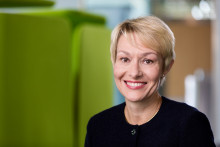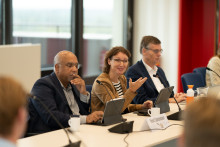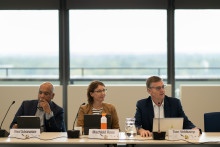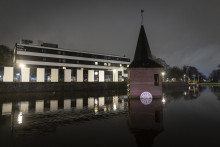You will continue to be chair of the Supervisory Board for the next four years, was this an easy or difficult choice?
'Actually, it was a no-brainer. Not only do I enjoy doing it, it is above all the sense of responsibility that comes with it that I value. When I start something, I want to do it right and get the job done. If there are no compelling reasons to stop, I will continue. In that sense, this reappointment felt more like a formality.'
How do you look back on your previous years as a member and chair of the Supervisory Board?
'Never a dull moment, I can conclude. I started in the middle of the corona crisis and can still remember my first meeting here on an almost deserted campus – with everyone in the meeting room, keeping their distance. Soon, the president and vice-president of the UT (Victor van der Chijs and Mirjam Bult, ed.) left in succession. Then, as a supervisor, you are in a heightened state of alertness: is something wrong? No, fortunately that turned out not to be the case.
However, we had to quickly look for two new board members. I think we have succeeded in putting together a team that operates as a unit, with an unambiguous vision and a clear voice to the organization, which has improved trust and cooperation in the organization. Where does that show? I see that the relationship between the Executive Board and the University Council has improved considerably; The mistrust that was there before has disappeared. Another example is that last academic year we held discussions in the run-up to the eventual reappointment of Rector Tom Veldkamp. The feedback was that this board has turned the deans into a team. That's also a positive sign.'
Today, the UT is facing numerous financial challenges, with immense government cutbacks still to come. What do you think is needed to turn the tide?
'I approach it from two perspectives. From the perspective of the Netherlands: this cabinet is doing something incredibly stupid. I can't make much else out of it. For decades, we have been aware of the importance of the Netherlands as a knowledge economy. Now, all of a sudden, the basis of that knowledge economy is being cut. That has nothing to do with vision, that's populism.'
And that different perspective, that's what the university notices from that?
'Exactly, it's how you relate to those developments. And that's where your identity as a university comes into play: who are we and where do our strengths lie? That requires, as I said in an earlier interview, to have the right conversation with each other. That is why I am pleased with the document Reinventing our UT from the Strategic Council. That's a good start to create a future vision.'
'I wonder if all the information is trickling down to all employees'
But in the meantime, the UT is currently facing serious acute financial concerns. It is also not inconceivable that the Education Inspectorate will have to intervene, if that situation does not change...
'That's exactly why we need a perspective for the future. Not only because otherwise you will only react to developments instead of relying on your own strengths. But above all, because you have to make sure that you don't just operate from the status quo, but know where you want to go. You need that direction to be able to take bigger steps, and they are needed now given the financial situation. What I've noticed – since these financial developments have been going on – it feels like everyone is waiting for everyone else. The faculties are waiting for the Executive Board and the Executive Board is waiting for the faculties, which are independent administrative units. And I wonder if all the information is trickling down to all employees. To solve these problems, it cannot come from the Executive Board alone. I don't know if that realization has landed everywhere. To be honest, it's taking too long for me. We need to get out of the current everybody-waits-for-everybody mode.'
Have you intervened as a supervisory board?
‘I wouldn't define it as intervening. For example, it's not that we're saying: you should introduce a hiring freeze now. What we have done is make the urgency clearer, sit around the table more often and have more substantive conversations: what is needed to remain financially healthy and what measures would be appropriate? At the beginning of my chairmanship of the Supervisory Board, we wrote a vision on supervision. The gist of it was: we are more council than supervisor. Of course, this is easier in good times than in bad. Reflecting on this, we have been sitting in the supervisory chair more in the past year. But what we should not do is that we, as supervisors, take the place of the administrators. Just as the Executive Board should not take the place of deans. Everyone wants the best for this university in their own role. As a supervisory board, we have to make sure that the university is able to do it itself and sees prospects for action.'
Do you have enough confidence in the Executive Board to turn the tide?
'Unequivocally: yes. And it's a yes, and... By that I mean that these times demand something from a university administrator that goes beyond the package that someone is normally in charge of. There is a very tough change task on the table and that requires an approach that goes beyond focusing on the content of education, research and valorisation. So we have to keep talking about what kind of help is needed.'
'In recent years, we have allowed a number of things to happen that are not good'
Can you offer certain help based on your background, including ten years at the Dutch Central Bank?
'I don't think so much in terms of finance, but in terms of change processes. It is important that we know how to change something within the organization itself in a sustainable way. Within my current organization (Butzke is COO at venture builder NLC Health Ventures, ed.) we want to build The Good City. It consists of three elements: eco instead of ego, the ability to learn and balance: you have to be able to unite contradictions. These three elements also apply to the UT.'
In what way?
'In recent years, we have allowed a number of things to happen that are not good. If you just look at education, the student-staff ratio is really not good. There are a number of small programmes of which you may wonder whether the education is offered efficiently enough. Then it is important to be able to unite contradictions: how can we organise education more efficiently without letting go of the small-scale and people-oriented? So we should not shy away from the difficult questions. Not only for a small programme, but also about how we are organised in general terms. Is the current form with five faculties and three institutes the most effective?'
About Sylvia Butzke
Sylvia Butzke has been a member of the UT Supervisory Board since November 2020 . Since the summer of 2021, she has been chair of the university's supervisory body. She is also operational director at venture builder NLC Health Ventures. In the past, she worked at pension organisation PGGM, De Nederlandsche Bank and the Boston Consulting Group, among others.
Recently, after the NRC publication, there was an uproar around Supervisory Board member Jan Kimpen. You then came with a statement. How do you reflect on this issue?
'We talked about it at length, after which we finally asked ourselves two questions: do we have any doubts about Jan's integrity? And: what do we think of someone sitting on the UT's supervisory board while being under fire, considering that the issue might come back in the future and that the UT might be negatively influenced? After all those conversations, we answered the first question with a resounding no. Jan has told us how it really is, but it's not up to us to tell this story. We are not a party in this. We also thought about that second question and concluded: this is a trial by media. We, as the Supervisory Board and the Executive Board, thought it was important that we did not participate in this. I can imagine that some people have doubts about our decision, but: why should I risk my own integrity and reputation – and that of the UT? We have acted to the best of our knowledge and belief.’
In four years' time, your time as a UT supervisor will officially be over. Where do you hope this university will be?
'That future vision that I mentioned, it is there and it is lived in all areas. That's what we're going for. When I read the Reinventing our UT document again, we were the first university with a real campus, the first to connect STEM and social sciences, the first to weave entrepreneurship into education... We're going to add something to that list. I am almost certain that in four years' time we will be the first fully-fledged fourth-generation university that is strongly intertwined with society. I understand that there is still uncertainty from The Hague, including about the Internationalisation in Balance Act. But actually, we do know how to move forward: working on a sustainable future vision based on our own identity. If you don't, you'll be at your wit’s end.'






